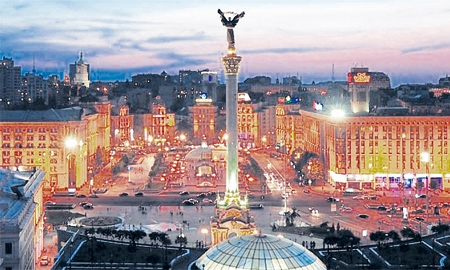Two decades ago, the Ukrainian nation emphatically declared itself an independent state from the former Soviet Union. On August 24, 2011, leaders from around the world, including Barack Obama, Dmitry Medvedev, Nicolas Sarkozy and Hu Jintao, among many others, sent President Viktor Yanukovych Independence Day greetings in a show of international support for the anniversary.

The following day, in an article for the Wall Street Journal, President Yanukovych presented his view of Ukraine today as a “modern and dynamic country in which small-business ownership is on the rise, creativity is thriving, and the market is picking up after a difficult recession. In the last year alone, foreign direct investment increased by 35%.”
Recording positive GDP growth of 4.2% in 2010 would be considered quite good for any given country. For Ukraine, however, it represents a triumphant upturn for the economy after a demoralizing 15% drop in 2009, and a morale-boosting achievement for the new government.
The global financial crisis of 2008-2009 caught Ukraine in the middle of an ongoing feud between the parliament, the government and the president. “It was evident when the crisis started that all three branches of government needed to unite to form one collective strategy to confront it head on, but this didn’t happen,” explains Prime Minister Mykola Azarov, who also blames the former administration’s absolute populist strategy, the absence of a Minister of Finance and the fact that “none of the reforms that were so desperately needed for the country were implemented.”
The government headed by Mr. Yanukovych, which came to power in late February 2010, has rescued the republic from what could have been a catastrophe. His administration immediately formed a coalition, established the power hierarchy in the regions, and laid out serious reforms to balance the budget, restore financial stability and attract investment.
“The state apparatus became operational,” says Andriy Klyuyev, First Vice Prime Minister and Minister of Economic Development and Trade. “We’ve made considerable progress in matters related to total deregulation of the economy, simplifying the legislative environment for business. We’ve reduced by one-third the number of activities that require special government licenses. We’re taking serious steps to simplify business regulation. We’ve introduced concepts like a ‘one-stop shop’ for investors. We’ve created a specialized investment promotion agency, and today it is represented in every region of Ukraine.”
He adds that the government has been restructured, eliminating outdated ministries and adopting EU standards.
Economic growth is holding steady above 4%, and the Economist Intelligence Unit predicts GDP growth of 4.6% for 2011. According to Mr. Klyuyev, even higher growth could be attained if the agricultural sector is able to metaphorically recover ground lost last year to droughts. Other sectors Mr. Klyuyev and Mr. Azarov highlight for their potential are engineering, metallurgy, energy (including shale gas and renewables), transport, and tourism – especially relevant now due to the election of Ukraine as co-host of the UEFA Euro 2012 soccer tournament along with Poland.
Hosting such a high-profile competition has entailed a massive drive to significantly boost Ukraine’s infrastructure, with new stadiums, improved rail links and widespread road upgrades taking shape. In April 2011, Deputy Prime Minister and Infrastructure Minister Borys Kolesnikov promised that an additional UAH 2.4 billion ($302 million) would be allocated from the state budget for the construction and reconstruction of roads in Ukraine’s Euro 2012 host cities of Kyiv, Kharkiv, Donetsk and Lviv. (Poland’s four host cities are Gdansk, Poznan, Warsaw and Wroclaw.)
According to the Prime Minister, “We have built 1,500km (932 miles) of modern motorways this year. In next year’s first quarter, we’ll have completed construction of all highways for Euro 2012. It will then take eight hours of comfortable travel from the west to the east of Ukraine. If we work at such a pace we’ll have European quality roads in 10 years.”
With the economy enjoying positive growth, the government is in an improved position to continue forward with the much-needed reforms. Oleg Popov, CEO of System Capital Management (SCM), Ukraine’s largest and most successful holding company, says, “Now we feel quite optimistic about the future of Ukraine because our government is no longer engaged with short-term projects and victories exclusively, but with long-term development perspectives elaboration and the reforms that the country needs as well.”
The major ones under way today include: the land reform, which will greatly enhance the flow of investment into the country and boost agribusiness; the pension reform, key to unlocking further financing from the International Monetary Fund; and a new tax code that Borys Kolesnikov, Deputy Prime Minister, described in an interview with the Financial Times as “one of the most liberal tax codes in Europe.”
Ukraine’s economic comeback and political stability have done nothing but enhance the republic’s relations with the international community, and the government would like to see increased cooperation with the European Union and the United States.
“Our partnership with the U.S. is important not only in a bilateral context but also for our relations with international financial institutions and other international organizations,” comments Olexander Motsyk, Ukrainian Ambassador to the U.S.
Mr. Motsyk says that his country boasts a market of almost 50 million, “a very convenient” geographical location, and a highly educated population that translates into great potential for technology development.
In the Wall Street Journal, President Yanukovych also pointed out: “Not only does my country boast an educated labor force and a rich foundation in science and technology, but we also serve as a bridge connecting European, Russian and Asian markets.”
However, Ukraine's partnership with the West is far from limited to only economic and strategic interests. According to the President, “It also includes a shared culture of values and a commitment to democracy, human rights and international peace.”
0 COMMENTS